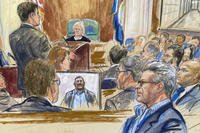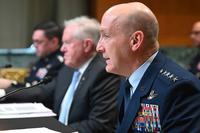Starting today, the Defense Commissary Agency (DeCA) will require ID checks at store doors and block all non-authorized shoppers from entering, system officials announced in a Facebook post this morning.
"To better serve our customers starting on Wednesday, March 18, we will begin 100% I.D. card checks at the entrance of all stores and will revoke the visitor policy," the post states. "We believe this will reduce the number of people in our stores and help with social distancing and crowd control."
The visitor policy allows “an authorized patron to bring guests into a commissary during shopping visits,” according to the system’s website. “Your guest is not authorized to make commissary purchases, and you are not permitted to make commissary purchases for your guest.”
The rule change blocks spouses and family members of disabled veterans and Purple Heart recipients, newly authorized to shop early this year, from entering the store. Those veterans are permitted to shop by using their Department of Veterans Affairs Health ID Card. Their family members, however, are considered visitors.
Related: Here's the Guest Policy for Newly Eligible Commissary and Exchange Shoppers
Other authorized shoppers include anyone holding a Defense Department ID card, including active-duty family members and retirees, and shoppers known as "authorized agents," typically given a long-term pass by the base so that they can shop on behalf of a sick or elderly family member.
DeCA also announced plans to eliminate stores' "early bird" hours starting Thursday to allow workers more time to restock and clean. While the list of those permitted to shop during that time block varies base by base, "early bird" hours typically allow a sub-group of patrons, such as uniformed troops or disabled veterans, to come into the store 30 minutes before official opening. They are also requiring users to scan their own ID cards at check out to reduce the customer-to-customer spread of germs, they said in a release.
Meanwhile, base officials nationwide are making their own changes to shopping rules at their local commissary. Officials at Fort Gordon, Georgia, for example, are blocking all non-active-duty troops and family members from shopping before noon. At Buckley Air Force Base, Colorado, shopping is restricted to mission-essential personnel only for the first two hours of operation.
"Installation commanders are making decisions at many installations to adjust shopping times for specific shopping categories such as active duty or retirees, etc.," Kevin Robinson, a DeCA spokesman, said in an email.
Elsewhere, patrons have reported military police officers dispatched to the stores to control crowds. For example, on March 13 at Fort Hamilton, New York, police officers were dispatched after a shopping cart shortage resulted in crowding and long lines.
-- Amy Bushatz can be reached at amy.bushatz@military.com.
Read more: More coronavirus coverage
This story was updated March 18 to reflect new customer ID card scanning rules.












